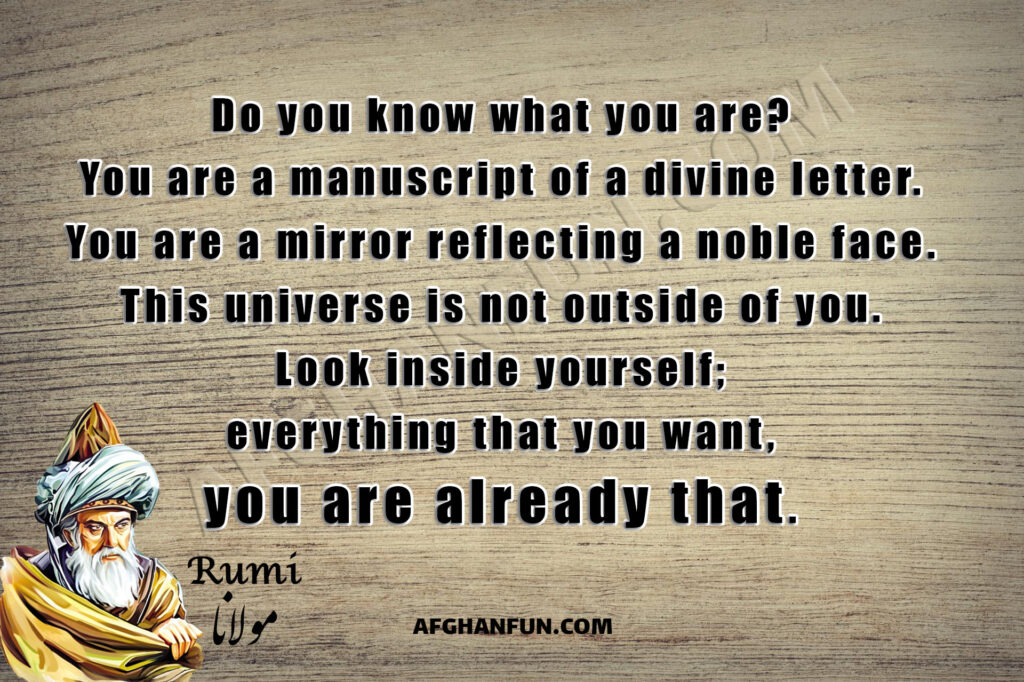Unlock Your Inner Power with Rumi’s Spiritual Wisdom

Find Yourself Within: Rumi’s Path to Self-Realization
Do you know what you are?
Rumi
You are a manuscript of a divine letter.
You are a mirror reflecting a noble face.
This universe is not outside of you.
Look inside yourself;
everything that you want,
you are already that.
آیا میدانی که چه هستی؟
مولانا
تو نسخهای از نامهای الهی هستی.
تو آینهای هستی که چهرهای شریف را منعکس میکند.
این جهان بیرون از تو نیست.
درون خودت را بنگر؛
هر آنچه را که میخواهی،
تو پیشاپیش همان هستی.
این نقل قول از مولانا نشاندهنده عمق نگاه او به انسان و جایگاه الهی اوست. مولانا میگوید که هر انسان در اصل بخشی از ذات الهی است و حامل پیام الهی. او انسان را همچون آینهای میداند که میتواند حقیقت و زیبایی الهی را منعکس کند. جهان بیرونی چیزی جدا از انسان نیست، بلکه انعکاسی از درون اوست. اگر انسان به درون خود بنگرد و ذات خود را بشناسد، درمییابد که هر آنچه آرزو دارد و جستوجو میکند، از پیش در وجود او نهفته است. این بیان دعوتی است برای خودشناسی و درک عمیق از ارتباط انسان با کائنات و خداوند.
МАВЛОНО ҶАЛОЛУДДИН МУҲАММАДИ БАЛХӢ
Оё медонӣ, ки ту чӣ ҳастӣ?
Ту як дастнависи номаи илоҳӣ ҳастӣ.
Ту оинае ҳастӣ, ки рӯи шариферо инъикос мекунад.
Ин олам берун аз ту нест.
Ба даруни худ нигоҳ кун;
ҳар чизеро, ки мехоҳӣ,
ту аллакай ҳамон ҳастӣ
Ин сухани Мавлоно нишон медиҳад, ки инсон дорои мақоми илоҳӣ аст ва худ як номаи илоҳист. Мавлоно инсонро монанди оинае медонад, ки зебоӣ ва ҳақиқати илоҳиро инъикос мекунад. Ӯ мегӯяд, ки олам аз инсон ҷудо нест, балки як акси даруни ӯст. Агар инсон ба худ назар кунад ва худро бишносад, мефаҳмад, ки ҳар он чи орзу мекунад ва мехоҳад, аз пеш дар вуҷуди ӯ ҳаст. Ин сухан даъватест ба худшиносӣ ва фаҳми амиқи робитаи инсон бо кайҳон ва Худо.
هل تعرف ما أنت؟
مولانا جلال الدین الرومي
أنت مخطوطة لرسالة إلهية.
أنت مرآة تعكس وجهًا كريمًا.
هذا الكون ليس خارجك.
انظر داخل نفسك؛
كل ما تريده،
أنت هو بالفعل
هذا القول لمولانا يعكس رؤيته العميقة لكرامة الإنسان ومكانته الإلهية. يشير مولانا إلى أن كل إنسان هو جزء من الذات الإلهية ويحمل رسالة سماوية. يعتبر الإنسان مرآة تعكس الجمال والحقيقة الإلهية. الكون الخارجي ليس منفصلًا عن الإنسان، بل هو انعكاس لما في داخله. عندما ينظر الإنسان إلى أعماق نفسه ويدرك ذاته، يكتشف أن كل ما يبحث عنه ويطمح إليه موجود بالفعل داخله. هذه الكلمات دعوة إلى معرفة الذات وفهم العلاقة بين الإنسان والكون والله.
Let’s break down Rumi’s quote and analyze its meaning, themes, and significance.
The Quote:
“Do you know what you are? You are a manuscript of a divine letter. You are a mirror reflecting a noble face. This universe is not outside of you. Look inside yourself; everything that you want, you are already that.”
Analysis:
1. Core Message:
Rumi’s quote is a profound reminder of self-realization and inner divinity. It emphasizes that every individual is a unique expression of the divine, carrying within them the answers to their deepest desires and the essence of the universe itself. The message is deeply spiritual, urging readers to look inward rather than seeking fulfillment externally.
2. Key Themes:
- Inner Divinity: The quote suggests that every person is a sacred creation, a “manuscript of a divine letter,” implying that we are written by the hand of the divine and carry a unique purpose.
- Self-Reflection: Rumi encourages introspection, urging us to “look inside yourself” to discover our true nature and potential.
- Oneness with the Universe: The line “This universe is not outside of you” reflects the idea that we are not separate from the cosmos but an integral part of it.
- Self-Sufficiency: The quote assures us that we already possess everything we seek (“everything that you want, you are already that”), promoting self-acceptance and self-love.
3. Spiritual and Philosophical Significance:
Rumi, a 13th-century Persian poet and Sufi mystic, often explored themes of love, unity, and the divine within. This quote aligns with his broader philosophy that the divine is not an external entity but resides within each individual. It echoes the Sufi belief in the concept of wahdat al-wujud (the unity of existence), where the self and the divine are interconnected.
4. Emotional Impact:
The quote is deeply empowering and uplifting. It invites readers to:
- Recognize their inherent worth and divinity.
- Let go of external validation and seek answers within.
- Embrace their true selves and trust in their inner wisdom.
5. Modern Relevance:
In today’s fast-paced, externalized world, Rumi’s words are a timely reminder to slow down, reflect, and reconnect with our inner selves. It resonates with anyone seeking purpose, self-acceptance, or spiritual growth.
External links
Works by Rumi at Open Library











